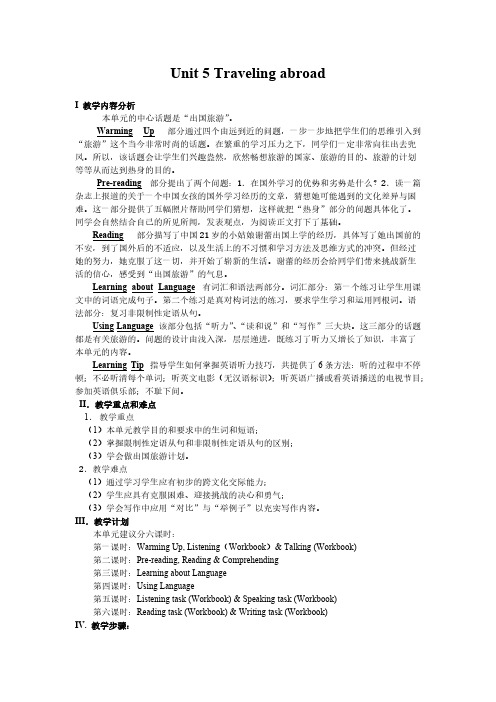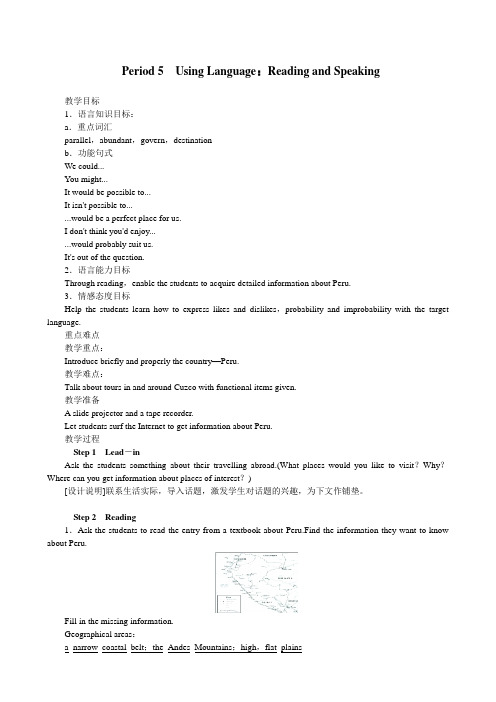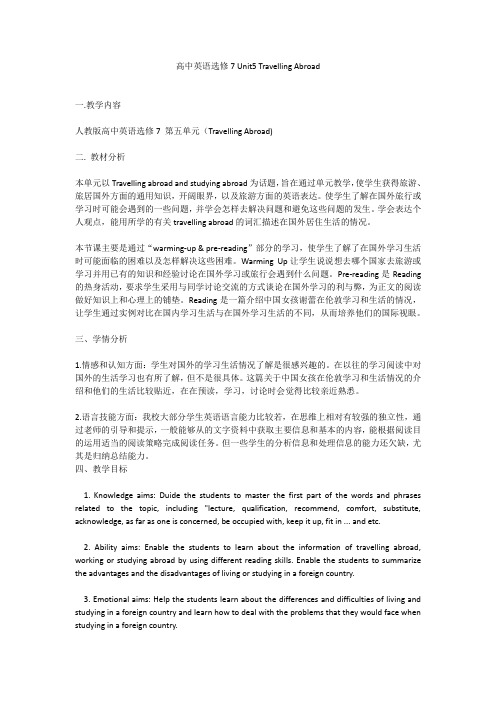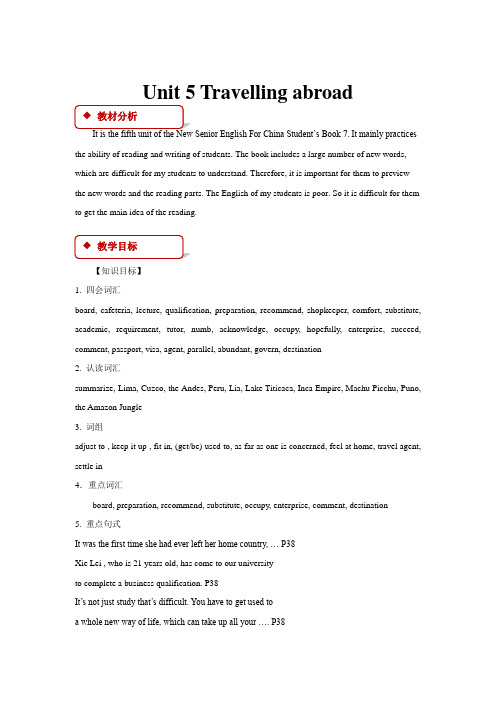高二英语选修7 unit5教案(精选.)
【VIP专享】选修七Unit5教案说课

Unit 5 Traveling abroadI 教学内容分析本单元的中心话题是“出国旅游”。
Warming Up 部分通过四个由远到近的问题,一步一步地把学生们的思维引入到“旅游”这个当今非常时尚的话题。
在繁重的学习压力之下,同学们一定非常向往出去兜风。
所以,该话题会让学生们兴趣盎然,欣然畅想旅游的国家、旅游的目的、旅游的计划等等从而达到热身的目的。
Pre-reading部分提出了两个问题:1.在国外学习的优势和劣势是什么?2.读一篇杂志上报道的关于一个中国女孩的国外学习经历的文章,猜想她可能遇到的文化差异与困难。
这一部分提供了五幅照片帮助同学们猜想,这样就把“热身”部分的问题具体化了。
同学会自然结合自己的所见所闻,发表观点,为阅读正文打下了基础。
Reading部分描写了中国21岁的小姑娘谢蕾出国上学的经历,具体写了她出国前的不安,到了国外后的不适应,以及生活上的不习惯和学习方法及思维方式的冲突。
但经过她的努力,她克服了这一切,并开始了崭新的生活。
谢蕾的经历会给同学们带来挑战新生活的信心,感受到“出国旅游”的气息。
Learning about Language 有词汇和语法两部分。
词汇部分:第一个练习让学生用课文中的词语完成句子。
第二个练习是真对构词法的练习,要求学生学习和运用同根词。
语法部分:复习非限制性定语从句。
Using Language 该部分包括“听力”、“读和说”和“写作”三大块。
这三部分的话题都是有关旅游的。
问题的设计由浅入深,层层递进,既练习了听力又增长了知识,丰富了本单元的内容。
Learning Tip 指导学生如何掌握英语听力技巧,共提供了6条方法:听的过程中不停顿;不必听清每个单词;听英文电影(无汉语标识);听英语广播或看英语播送的电视节目;参加英语俱乐部;不耻下问。
II.教学重点和难点1.教学重点(1)本单元教学目的和要求中的生词和短语;(2)掌握限制性定语从句和非限制性定语从句的区别;(3)学会做出国旅游计划。
人教版高中英语选修7优秀教案Unit5Travelling abroadPeriod 5新

Period 5Using Language:Reading and Speaking教学目标1.语言知识目标:a.重点词汇parallel,abundant,govern,destinationb.功能句式We could...You might...It would be possible to...It isn't possible to......would be a perfect place for us.I don't think you'd enjoy......would probably suit us.It's out of the question.2.语言能力目标Through reading,enable the students to acquire detailed information about Peru.3.情感态度目标Help the students learn how to express likes and dislikes,probability and improbability with the target language.重点难点教学重点:Introduce briefly and properly the country—Peru.教学难点:Talk about tours in and around Cuzco with functional items given.教学准备A slide projector and a tape recorder.Let students surf the Internet to get information about Peru.教学过程Step 1Lead-inAsk the students something about their travelling abroad.(What places would you like to visit?Why?Where can you get information about places of interest?)[设计说明]联系生活实际,导入话题,激发学生对话题的兴趣,为下文作铺垫。
人教版高二英语选修七Unit 5 Traveling Abroad教案设计

3. I went to the place _______ I visited ten years ago.
4. I went to the place _______ I worked ten years ago.
5. This is the reason ______ he was late.
4. Explanation
5. Discussion.
Step 1: Lead in
Enjoy an English song with attributive clauses. (设设计目的:通过听歌填词,引起学生对定语从句的注意和兴趣,并引出本节课的主题。)
Step2: The definition and structure of attributive clause 定义和结构
know other reasons? Guess! (设计目的:通过对点练习,巩固定语从句的结构和关系代词的基本使用.)
Step 5:Summary 关系词
指人
指物
从句中的作用
Who
√
主语,宾语
Whom
which
that
whoes Step 6:Homework 课外作业
1. Finish the exercises in the learning plan
Teacher will present a picture of her, and lead students to say some attributes. And then teacher
explains the antecedent, relative pronouns and clause. (设计目的:教师展示学生感兴趣的照片,引导学生自己说出定语和定语从句,以便激发学生学
高中英语选修7 Unit5 Travelling Abroad教案

高中英语选修7 Unit5 Travelling Abroad一.教学内容人教版高中英语选修7 第五单元(Travelling Abroad)二. 教材分析本单元以Travelling abroad and studying abroad为话题,旨在通过单元教学,使学生获得旅游、旅居国外方面的通用知识,开阔眼界,以及旅游方面的英语表达。
使学生了解在国外旅行或学习时可能会遇到的一些问题,并学会怎样去解决问题和避免这些问题的发生。
学会表达个人观点,能用所学的有关travelling abroad的词汇描述在国外居住生活的情况。
本节课主要是通过“warming-up & pre-reading”部分的学习,使学生了解了在国外学习生活时可能面临的困难以及怎样解决这些困难。
Warming Up让学生说说想去哪个国家去旅游或学习并用已有的知识和经验讨论在国外学习或旅行会遇到什么问题。
Pre-reading是Reading 的热身活动,要求学生采用与同学讨论交流的方式谈论在国外学习的利与弊,为正文的阅读做好知识上和心理上的铺垫。
Reading是一篇介绍中国女孩谢蕾在伦敦学习和生活的情况,让学生通过实例对比在国内学习生活与在国外学习生活的不同,从而培养他们的国际视眼。
三、学情分析1.情感和认知方面:学生对国外的学习生活情况了解是很感兴趣的。
在以往的学习阅读中对国外的生活学习也有所了解,但不是很具体。
这篇关于中国女孩在伦敦学习和生活情况的介绍和他们的生活比较贴近,在在预读,学习,讨论时会觉得比较亲近熟悉。
2.语言技能方面:我校大部分学生英语语言能力比较若,在思维上相对有较强的独立性,通过老师的引导和提示,一般能够从的文字资料中获取主要信息和基本的内容,能根据阅读目的运用适当的阅读策略完成阅读任务。
但一些学生的分析信息和处理信息的能力还欠缺,尤其是归纳总结能力。
四、教学目标1. Knowledge aims: Duide the students to master the first part of the words and phrases related to the topic, including "lecture, qualification, recommend, comfort, substitute, acknowledge, as far as one is concerned, be occupied with, keep it up, fit in ... and etc.2. Ability aims: Enable the students to learn about the information of travelling abroad, working or studying abroad by using different reading skills. Enable the students to summarize the advantages and the disadvantages of living or studying in a foreign country.3. Emotional aims: Help the students learn about the differences and difficulties of living and studying in a foreign country and learn how to deal with the problems that they would face when studying in a foreign country.五、教学重点及难点1. Widen the vocabulary range. Develop the students’reading skills namely skimming and scanning and so on.2. Guide the students to summarize the benefits and difficulties of living in a foreign country.六. 教学方法1.演示法:通过相关的图片、PPT等网络多媒体辅助显示给学生看,便于学生对基础知识和背景知识的把握,并从旧知识中获得启迪,从而达到解决问题的目的。
高中英语新人教版精品教案《选修七 unit5 usinglanguage》

Unit5 Traveling AbroadUsing language该部分包括“听力”、“读和说”和“写作”三大块。
这三部分的话题都是有关旅游的。
问题的设计由浅入深,层层递进,既练习了听力又增长了知识,丰富了本单元的内容。
本节课的内容主要是处理“读和说”这一块。
Teaching aims:1. To ensure Ss have really grasped the important words and phrases of the unit.2.Through listening and reading, enable the ss to acquire detailed information about Peru. Teaching important and difficult points:1.To get Ss to know something about how to give factual information about a place.2.Talk about toursTeaching methodListening, reading and talkingTeaching AidsMultimedia and blackboardTeaching Procedures:Step 1 RevisionHave a revision of the words in this unit.Step 2 lead-inHave a quiz to see how much they know about PeruStep 3 ListeningListen to the first passage on page 42,and then finish the following chartStep4 Reading1.The second is from a travel brochure and describes tours to places in Peru. First let's look at some pictures about these places mentioned in the travel brochure.2.Read the text on page 44, and answer the following questions.Tour 11. What can people see on tour 1?2. In what way will people travel on tour 1?3. How long will tour 1 last?Tour 24. What places will people get to?5. In what way will people get there?6. What can people do on this tour?7. Why are the islands floating?Tour 38. What places will people get to?9. What can people do on this tour?Tour 410. What places will people get to?11. In what way will people get there?12. What can people do on this tour?Step5 PracticeMatch the four tours with a proper person.______ 1. Mike, a well-paid photographer, whohas great interest in adventuring and exploration.He hopes to have an active holiday and shootsome pictures of different kinds of birds._______ 2. Elisabeth, who has retired recently,is planning for a leisurely vacation. She hopesto visit the museums, buy something specialand taste some delicious food.________3. Jenny, a hiking lover, hopes tospend some days hiking while enjoying thebeautiful natural scenery._______ 4. Alfred and his girlfriend. Not onlydo they hope to have a chance to experiencelocal people’s life, but also like to go travelingby boat in a romantic way.Step6 DiscussionIf you travel to peru some day, which place will you go? Have a discussion with your partner and talk about yourreason.Homework。
高中英语人教版选修7【教学设计】Unit 5

the ability of reading and writing of students. The book includes a large number of new words, which are difficult for my students to understand. Therefore, it is important for them to preview the new words and the reading parts. The English of my students is poor. So it is difficult for them to get the main idea of the reading.【知识目标】1. 四会词汇board, cafeteria, lecture, qualification, preparation, recommend, shopkeeper, comfort, substitute, academic, requirement, tutor, numb, acknowledge, occupy, hopefully, enterprise, succeed, comment, passport, visa, agent, parallel, abundant, govern, destination2. 认读词汇summarize, Lima, Cuzco, the Andes, Peru, Lia, Lake Titicaca, Inca Empire, Machu Picchu, Puno, the Amazon Jungle3. 词组adjust to , keep it up , fit in, (get/be) used to, as far as one is concerned, feel at home, travel agent, settle in4.重点词汇board, preparation, recommend, substitute, occupy, enterprise, comment, destination5. 重点句式It was the first time she had ever left her home country, … P38Xie Lei , who is 21 years old, has come to our universityto complete a business qualification. P38It’s not just study that’s difficult. You have to get used toa whole new way of life, which can take up all your …. P38I have been so occupied getting used to everythingthat I haven’t had time for social activities. …. P39I’m going to join a few university clubs and hopefullyI’ll meet some people I have things in common with. … P39Why does Lia prefer to…?I like/don’t like doing/ to do…I prefe r to…【能力目标】Enable Ss to know something about volunteer and Jo’s work in PNG as a volunteer teacher.Help Ss to learn about PNG and find out more information about the country through internet.【情感目标】Make Ss know what is a volunteer and the spirit of volunteers.Get the Ss to realize that they should make the most of what they own and do something for the poorHelp them realize the importance of sharing.【教学重点】Talk about travel or live in another countryPractise expressing and supporting an opinionRevise the Attributive Clause (non-restrictive)Write a letter to a penfriend.【教学难点】How to revise the Attributive Clause(non-restrictive).How to improve communication skills.How to write a letter.Multimedia。
人教版高中英语选修7Unit 5Travelling abroad教案5
Unit 5 Traveling abroadThe second period ReadingTeaching Aims: Reading1.1. Learn about Peru2. Practice expressing likes and dislikes, probability and improbability3. Sentence patterns:Likes and dislikes: I like/ don’t like doing/to doI prefer to…I enjoy/love/hate doingProbability and improbability:You might…we could…it’s would be possible to ……would probably suit usIt’s likely /unlikely that…….would be a perfect place for us.Important points:2.Learn about Peru3.Expressing likes and dislikes, probability and improbabilityDifficult pointsLearn to attract tourists through description of the tour lines. Teaching methods:Ask and answer questions activitiesIndividual, pair and group workTeaching aidsA computer and a projectorTTeaching Procedures & waysStep 1: lead inAsk the students something about their traveling to Mysterious Island. Talk about traveling abroad.Step 2: Reading1. Ask the students to read the entry from a textbook about Peru. Find the information they want to know about Peru. Geographical areas:Capital city Lima:Ancient Inca capital Cuzco:The famous Inca ruins Machu Picchu:Andes Mountains:2. Questions:a. Why is Cuzco popular with tourists?b. What is special about Lake Titicaca?c. What do you think the official languages of Peru are?Step 3: Reading (pair work)1). Ask the students to read the brochure below and answer the following questions:1.Among the four tours, which one would best suit people wholike an active hol iday and don’t need first class accommodation?2.What kind of people would enjoy Tour 2?3.On which tours do you visit Machu Picchu (马丘比丘)?4.If you spent two weeks in an around Cuzco, which tour would bebest to do last?Step 4. Speaking (group work)1. Ask the student to choose 1 tour line, trying to describe it with attractive words and tones using expressions of likes and dislikes, probabilities and improbabilities.2. Ask the students to sell it.Step 5: Discussion1. Imagine your group plans to spend eight days in and around Cuzco, discuss which tour you will take. (using expressions of likes and dislikes, probabilities and improbabilities.2. Ask the other students to vote the line they choose to travel, and give their reasonsStep 6: Homework:Feed back:教学设计自然且环环相扣,课堂气氛轻松活泼。
人教版高中英语选修7优秀教案Unit5Travelling abroadPeriod 3新
Period 3Grammar教学目标1.语言知识目标:复习非限制性定语从句的特点和关系词2.语言能力目标:能够写出含有非限制性定语从句的句子,并在书面表达中进行运用重点难点1.教学重点:掌握非限制性定语从句的特点,关系代词和关系副词使用的场合;能够运用非限制性定语从句。
2.教学难点:关系代词和关系副词使用的场合;在写作中运用非限制性定语从句;明确限制性定语从句与非限制性定语从句的区别。
教学准备1.学生的学习准备:复习非限制性定语从句的特点及关系词。
2.教师的教学准备:整理关系代词和关系副词的使用场合,并设计合理的场景。
3.教学用具的设计和准备:制作多媒体课件。
教学过程Step 1Presentation1.Enjoy a beautiful composition which comes from the 2008 Zhejiang college entrance examination.I prefer my English classes to be taught in both English and Chinese,whose_advantage_is_that_it_is_easy_for_us_to_understand_what_the_teacher_talks_about.The teacher first teaches the class in English,and then she explains those that_are_hard_to_understand_to_us so that we get a better understanding of the passage.That will be good for us.However,teaching the class in two languages will make the English atmosphere not so strong.Some students who_wish_to_be_taught_in_English_will be disappointed.Except for the disadvantage,I think it is really good to hear two languages in class.It can make us more familiar with the foreign culture.2.Show the sentences with the restrictive and non-restrictive attributive clauses in the composition on the screen.[设计说明] 欣赏高考满分范文,找出美丽的句子,能够很快地引起学生的兴趣,活跃课堂气氛,而且带有限制性定语从句和非限制性定语从句的出彩句子的出现,也为复习定语从句做好了准备。
人教版选修7英语 Unit 5 Travelling abroad reading 教案设计
Unit 5 Travelling abroadⅠ.Teaching aims :1 .Knowledge aims :(1).Let the students grasp the meaning of the mastery words and phrases .(2).Let the students catch the main idea of the passage and get somedetailed information of the reading .2 .Ability aims :Develop the students basic skills of listening, speaking ,reading and writing .3 .Emotional aims :Let the students understand the importance of Xie Lei’s achievements and arouse students’sense of understanding and respecting .Learn her optimistic attitude to life such as never giving up in face of difficulty ,solving the problems independently and so on .Encourage students work hard and achieve their aims .meanwhile ,Cultivate the students teamwork spirit .Ⅱ.Key points and difficult points in teaching :1 .Develop the students’ skills in reading ,such as scanning ,skimmingand detailed reading .2 .Learn some mastery words and expressions according to thecontext .3 .Retell the text and let the students express their thoughts using thewords learned in the passage .Ⅲ.Teaching Methods :Task-based method and students-centered methodⅣ.Teaching aids:A recorder and multi-mediaⅤ.Teaching procedures:Step 1 .Preparation :Divide the students into four groups and get them to finish one task . Let the students find out words and expressions related to traveling and studying abroad .Step 2.Revision and leading-inThe world is getting smaller and smaller. We have more and more opportunities to travel or study abroad. Travelling helps us learn a lot about local customs and broaden our views. Besides, it is relaxing and we can get rid of our anxiety and stress.Step 3.Pre-reading :Discussion :What are the advantages and disadvantages of studying in a foreign country?Advantages :1. Learn standard English.2. Communicate with the local people3. Know the manners and customs of the country better.4. Help us to be independent.Disadvantages : 1.Be difficult for us to communicate with the foreignpeople and we should adapt to the situation quickly.2. Cost a lot of money.3. Miss our homes, miss our parents and friends. Step 4 Reading :1 .Scanning : match the main idea to each paragraph Para.1 Para.2 Para.3 Para.4 Para.5 Para.6 Para.7A. The general introduction to Xie Lei and her studyB. The advantages of living with a host family.C. Xie Lei, a Chinese girl, is studying in a foreign country--London.D. Xie Lei is getting used to the Western University’s way of learning.E.. The newspaper will follow Xie Lei’s progress in later editions.F. The difficulties Xie Lei met while living in London.G. Xie Lei feels much more at home in England now and is living an active life.2 .Skimming :Task 1 :Fill in the blanks.Of doing a preparation course1.to help her to __________ western ____________;2.to get used to ________________.of living with a host familyBenefits 1. to learn more about ________ and _________.2.to have people to explain things ____________.of having a tutor1. to explain about why she cannot ______ what otherpeople had said without _______________it.2. to ___________ her to express her own ideas.at the university1 .to learn to read ______ and ________the texts. Difficulties 2.to __________her own opinion with_______.of a new way of life1.to find a ____ between study and a ________.2.to make new ______.3 . Detailed readingTask 1 :Summarize the main idea of the whole text.It mainly talks about the Chinese student Xie Lei’s ___________, especially about some _______ she gets as well as some_______ she faces while studying in London.Task 2:DiscussionWhat kind of person do you think Xie Lei is? Find evidence in the article to support your opinion.4 .Post-reading :Interview :Suppose you are a newspaper reporter .Please interview Xie Lei .Step 5 Homework :1. Underline all the important and difficult phrases and sentences inthe text.2.Suppose you are Xie Lei , Write a letter to Your parents to tell them about your learning abroad.The designs on the blackboard:Step 1 .PreparationStep 2.Revision and leading-inStep 3.Pre-readingStep 4 Reading教学反思:。
人教版高二英语选修七Unit 5 Traveling Abroad教案设计
Unit5 Travelling abroadReading and speaking教学设计一、教学背景1. 教材分析(1)本单元以travelling abroad为话题,包括两篇阅读,它们分别以“出国学习”和“出国旅游”为话题。
旨在通过单元教学,使学生了解在国外旅行或学习时可能会遇到的一些问题,并学会怎样去解决问题和避免这样问题的发生。
学会表达和支持个人观点,能用所学的有关travelling abroad的词汇描述在国外居住生活的情况,在国外旅游时能根据所给的信息选择恰当的旅游线路。
本单元的整体框架为:WARMING UP;READING;LEARNING ABOUT LANGUAGE三大部分。
USING LANGUAGE中的第一课时Listening第二课时Reading and speaking。
第一课时Listening让学生了解有关Peru这个国家的一些情况,为下面的reading and speaking 作铺垫。
(2)教材的重组USING LANGUAGE中的Listening与Reading and speaking都是谈论有关秘鲁这国家,介绍秘鲁的景色以及在秘鲁旅行的几条路线,内容一致,所以放在一起,设计成"听说课"。
今天说课的内容是第二课时Reading and speaking阅读部分主要依据地图对秘鲁这个国家进行介绍,要求学生skim(to get the main idea),再scan( to get the details), 然后回答3个Wh-问题。
文章还提供了一个旅游小册子,其内容包括在秘鲁旅游的四条路线。
要求学生在读后根据文章细节回答四个问题。
Speaking部分主要是设置了一个情景your group plans to spend eight days in and around Cuzco。
要求学生依据所提供的旅游手册来选择适合自己团队的旅游路线。
- 1、下载文档前请自行甄别文档内容的完整性,平台不提供额外的编辑、内容补充、找答案等附加服务。
- 2、"仅部分预览"的文档,不可在线预览部分如存在完整性等问题,可反馈申请退款(可完整预览的文档不适用该条件!)。
- 3、如文档侵犯您的权益,请联系客服反馈,我们会尽快为您处理(人工客服工作时间:9:00-18:30)。
Unit 5 Travelling abroad I.单元教学目标III. 教材分析与教材重组1. 教材分析本单元以travelling abroad为话题,旨在通过单元教学,使学生了解在国外旅行或学习时可能会遇到的一些问题,并学会怎样去解决问题和避免这样问题的发生。
学会表达和支持个人观点,能用所学的有关travelling abroad的词汇描述在国外居住生活的情况,在国外旅游时能根据所给的信息选择恰当的旅游线路,能推测什么事情可能会发生,哪种情况不会发生,会正确使用非限制性定于从句。
1.1WARMING UP 提供了四个有关旅行的问题,让学生用已有的知识和经验讨论在国外居住或旅行会遇到什么问题,并且该如何来解决这些问题。
1.2 PRE-READING是READING的热身活动。
提供了两个问题,它要求采用与同学讨论交流的方式谈论在国外学习的利与弊,激发同学们的学习兴趣。
1.3 READING是一篇介绍中国女孩谢蕾在伦敦学习的情况。
使学生对比在国内学习与在国外学习的不同。
Try to understand some of the benefits and difficulties she has in London.1.4 COMPREHENDING练习1通过四个问题来检查学生对课文的细节的理解。
练习2以图表的形式来分析在国外学习的利与弊。
练习3设置了五个讨论题,通过这些话题的谈论,挖掘文章的深层含义,激活学生自身的认知能力和思想认识能力。
练习4是概括能力训练题,在理解的基础上,重点训练学生的概括能力。
1.5 LEARNING ABOUT LANGUAGE分词汇和语法两部分。
其中,Discovering useful words and expressions是训练学生在语境中掌握词汇的能力,帮助学生加强动词变化形式的意识。
Revising useful structures 是关于非限制性定于从句,旨在训练学生对定语从句的理解、掌握和运用,并通过语法练习加以巩固。
1.8 USING LANGUAGE中的第一部分Listening要求学生先根据秘鲁的地图谈论有关秘鲁这个国家的一些情况, 然后完成三个相应的任务型练习。
首先是要求学生在听第一遍时能完成听力练习1的任务,即:选择那些是Lia喜欢做的事;听第二遍是要求学生回答五个问题;练习3是填空题。
通过这些题,培养学生学会获取听力材料中的具体用词和细节要点,同时让学生了解有关Peru这个国家的一些情况,为下面的reading and speaking 作铺垫。
第二部分Reading and speaking 作为一个整体教学材料。
阅读部分主要依据地图对秘鲁这个国家进行介绍,要求学生skim(to get the main idea),再scan( to get the details), 然后回答3个Wh-问题。
然后为大家提供了一个旅游小册子,其内容包括在秘鲁旅游的四条路线。
要求学生在读后根据文章细节回答四个问题。
Speaking部分主要是设置了一个情景your group plans to spend eight days in and around Cuzco。
要求学生依据所提供的旅游手册来选择适合自己团队的旅游路线。
进一步了解有关旅游的一些注意事项,并学会表达计划和任务。
这是一个任务型训练题,旨在培养学生的口语表达能力和实践能力。
1.9 WRITING 要求学生给一位即将到中国来学习的美国笔友写一封信,在信中向他介绍中国的一些情况,在中国的学习、生活中可能会遇到的问题及解决问题的办法,告诉他怎样更好的学习中国的文化以及你将提供给他的帮助。
2. 教材重组2.1 从话题内容上分析,WARMING UP 与READING相一致;而从训练目的上分析与TALKING比较一致。
从教材份量来说,可将WARMING UP与Workbook中的TALKING, SPEAKING TASK整合在一起,设计成一节任务型“口语课”。
2.2 可将PRE-READING, READING与COMPREHENDING三个活动整合在一起上一节“阅读课”。
2.3 USING LANGUAGE中的Listening与Reading and speaking都是谈论有关秘鲁这个国家,介绍秘鲁的景色以及在秘鲁旅行的几条路线,内容一致,所以放在一起,设计成一节"听说课"。
2.4可将LEARNING ABOUT LANGUAGE 与Workbook中的LISINGSTRUCTURES语法练习题整合在一起上一节“语法课”。
2.5 可将Workbook 中的Listening与Reading Task 与Writing Task 整合起来,上一节“综合实践课”。
2.6将WRITING 与Learning Tip 与Workbook中Project整合成一节“写作课”。
3. 课型设计与课时分配(经教材分析,根据学情,本单元可以用六课时教完)1st period Speaking2nd period Reading3rd period Listening and Speaking4th period Grammar5th period Integrating skills6th period WritingⅣ. 分课时教案The First Period SpeakingTeaching goals 教学目标1. Target language目标语言:a. 重点词汇和短语adjust to,advantage,find out ,youth hostels,communityb. 交际用语expressing and supporting an opinionYou might …It’s a possibility...Probably…It’s (very) possible that...It could happen.Most probably...It’s not very likely… I doubt it.He/She/They will probably...2. Ability goals能力目标Enable the students to discuss what they would learn when traveling or living in another country. And how to deal with the problems and dangers that could happen while traveling in a foreign country.3. Learning ability goals 学能目标Help the students learn how to deal with the problem that they could meet while traveling..Teaching important points教学重点Let students learn to use the structures of expressing and solve the problems. Teaching difficult points 教学难点How to deal with the problems that are likely to happen when traveling and how to prevent them.Teaching methods教学方法1. Looking at the questions. (individuals).2. Pairs work to discuss and work in groups of four.(task-based , cooperative learning).Teaching aids教具准备1. A computer2. A projectorTeaching procedures & ways教学过程与方法Step I Greeting and RevisionT: Good morning/afternoon, boys and girls! First, let’s check the homework.1.Check whether they have remembered the ten important sentences.2.Check whether they have previewed the new words and expressions in this unit.Step II Warming up*Talk about the problems with the teacher’s help.T: If you had chance to go abroad in the world, which country would you like to visit and why ? and what kind of things would you meet or learn best? Look at the problems on Page 37. You can discuss the following questions with your partner. Qs: 1.If you could go anywhere in the world, which country would you like to visit and why?2. What kind of things would you learn best by being a tourist in a country andwhat would you learn best by working or studying there?3. How differences or easy do you think it is to adjust to living or traveling inanother country? What kind of differences might you experience?4. Have you talked to anyone who has spent some time in another country? Whatdid they find unusual or difficult about it?DiscussionSa: If I had chance to travel abroad, I’d like to visit New Zealand. It’s said that it’s a beauti ful country, I’d like to enjoy the beautiful scenery in New Zealand.Sb: If I had chance, I’d like to go to America. Maybe it is better if I could work or study there, then I could learn English well.Sc: I ‘d like to go to Egypt, because I want to kno w about the ancient culture.T: What kind of things would you learn best by being a tourist in a country and what would you learn best by working or studying there?Sa: When we travel to another country, maybe we could know about the architecture of the country, the beautiful scenery, the economic situation and so on.Sb: When we work or study in the country, maybe we could know more about the manners and customs of the country. We could learn the standard English better, we could communicate with the local people to improve our English.Sc: If we could live with the local people, we could know the proprieties of the country, know more slang, know the difference in time, food, transportation etc. between the two countries.T: Very good. You can think so many things. Have you talked to anyone who has spent some time in another country? What did they find unusual or difficult about it? Ss: Well, I have talked to my friend who had been to a foreign country, he told me something different or interesting in the foreign country. For example, in India, most people don’t eat meat, especial beef, they like to eat vegetables and fruits, so if you invite an Indian for dinner, never order steak for them.Step III SpeakingT: Well, we talked about the things that we could learn while we traveling or studying in a foreign country. Then, what kind of problems or dangers would happen while traveling in a foreign country? Now, turn at page to P82, try to list the dangers andproblems, then discuss ways you could prevent these things happening in groups. The following sentence patterns are helpful for you:You might… Most probably, …It’s a possibility… It’s likely/unlikely that…Probably, … It’s not very likely… I doubt it. It’s (very) possible… He/She/They will probably.It could happen.(After a few minutes)T: Well, are you ready ? Who’d like to show us your opinion?Sa: While traveling, it’s possible that you could lose you way, because you don’t know the country very well. To prevent this:◆You’d better take a map of the country with you.◆Don’t leave alone without saying a word.◆Pay attention to the conspicuous signs, for example, some famous buildings,some special road signs so that you can ask the way while you are lost.Sb: It’s likely that we could meet malefactors--- robber, thief or others. Probably, we will be hurt. To prevent this:◆Don’t show your valuable belongings to others.◆You’d better go along with other p eople.◆Should you face dangers, connect the police.Sc: It’s (very) possible that we could have difficulty in communicating with the local people. To prevent this:◆Try to grasp the simple and basic communicated language◆Try to know about the manners and customs of the country◆Try to be familiar with formality in everyday lifeStep IV Talking (若时间不足,可改为作业)T: OK! So much for the questions. You did a very good job, I’m sure that you have known how to deal with the problems while traveling or studying in a foreign country. If we wanted travel alone with a little money, could you find a good way tosave money?Sa: Maybe we could travel on foot or by second-class rail.Sb: We could stay at the small inn to save money, but maybe the situation there is not good.T: Well, there is a good and not expensive place for travellers--- Youth Hostels, Hostels provide clean safe place to stay and have community kitchens. Now, let’s read something about Youth Hostels and discuss the questions in groups.(5 minutes later.)T: OK. Let’s look at the questions. Are youth hostels expensive or cheap to stay in? Ss: They are cheap. They offer quality accommodation at low cost.T: Yes. And how many people share a bedroom in a hostel?Ss: There are 4,5, or 6 people.T: What is the advantage of staying in a place with a kitchen when you are traveling? Ss: If there were a kitchen in the hostel, I could cook by myself, it’s It is good economy to cook on my own.T: What is the advantage of having a Youthpass?Ss: Youthpass offers travelers cheap train fares in most European countries. It can make you maximize your time and minimize your cost.T: How old must you be to get a Youthpass?Ss: For those under age 26 on their first day of travel.T: Why is it a good idea to buy travel insurance?Ss: Because while traveling, we may face unexpected illness or accident, no matter where you go to in the world, the cost of medical treatment can be very high, if you buy travel insurance, it can afford all medical treatment of you while traveling abroad. T: Then would you enjoy staying in a youth hostel? Why?Ss: Though there are many advantages of staying in a youth hostel, I still like to travel in collective tour. Tourists can help each other in case of an emergency.Ss: Well, I like youth hostel very much. Because I like traveling on my own, I like to enjoy the sense of freedom, I can do whatever I like. Also, it’s convenient for traveler to stay in youth hostel.T: Good. There is little time, let’s look at our homework. Step V Homework1.Learn the new words and expressions by heart 2.Let students talk about their experiences of travelling最新文件仅供参考已改成word文本。
